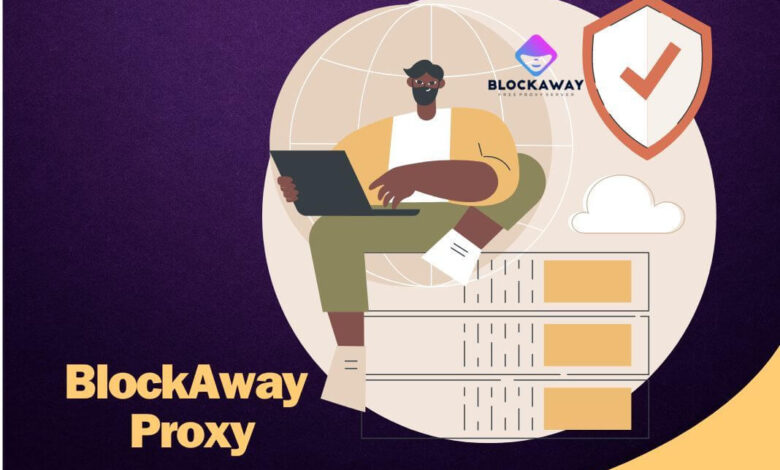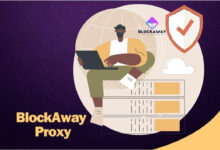What is Blockaway Proxy?

In today’s interconnected world, online privacy and security are of paramount importance. With the increasing threats of cyberattacks, data breaches, and surveillance, individuals and organizations are continually seeking tools to enhance their online privacy. One such tool is a proxy server, which acts as an intermediary between a user’s device and the internet. Among the various types of proxies, Blockaway Proxy is an emerging solution designed to provide enhanced privacy, security, and unrestricted access to online content.
But what exactly is a Blockaway Proxy, and how does it differ from other proxies? In this article, we’ll explore what a Blockaway Proxy is, how it works, and its potential benefits.
What is a Proxy?
To understand Blockaway Proxy, it’s essential to first understand the concept of a proxy server. A proxy server is a system that acts as a middleman between a user and the internet. When a user sends a request to access a website or online service, the request is routed through the proxy server. The server then forwards the request to the destination on behalf of the user, and when the response is received, it is sent back to the user.
Proxy servers are used for a variety of purposes, including:
- Anonymity: Masking the user’s IP address to maintain privacy.
- Bypass Restrictions: Accessing geo-blocked or region-restricted content.
- Security: Filtering out malicious traffic or preventing access to certain sites.
- Performance: Caching frequently visited websites to speed up browsing.
What is Blockaway Proxy?
Blockaway Proxy is a specialized proxy service designed to help users protect their online identity, bypass internet censorship, and avoid geo-blocking while also ensuring secure and private browsing. It is tailored to handle certain types of traffic and content restrictions that other proxies may not be as efficient at circumventing.
Key Features of Blockaway Proxy:
- Bypass Censorship and Geo-restrictions: Blockaway Proxy helps users bypass government-imposed censorship or region-based restrictions on websites. For instance, users in countries with strict internet controls, like China or Iran, can use Blockaway Proxy to access blocked websites and platforms. It also enables users to access streaming services that may be available only in specific regions, such as Netflix, Hulu, or BBC iPlayer.
- Enhanced Privacy and Anonymity: A significant feature of Blockaway Proxy is its ability to mask users’ IP addresses, making it more difficult for websites to track them. This increased anonymity can help protect users from surveillance, advertisers, and hackers looking to monitor their online activities.
- Security: Blockaway Proxy often provides encrypted connections, which ensures that the data being sent between the user and the internet is protected from interception. This is particularly valuable when using unsecured networks like public Wi-Fi in cafes or airports, where the risk of data theft is higher.
- Anti-Tracking: In addition to masking your IP address, Blockaway Proxy can block tracking cookies and scripts, helping to minimize the amount of data websites can gather about your online behavior. This is especially useful for individuals concerned about their digital footprint and privacy.
- Fast and Reliable Connections: Blockaway Proxy is often designed to offer fast, stable connections for users who need to access content quickly, such as video streaming or browsing. The proxy service typically utilizes a network of high-performance servers to provide this reliability.
How Does Blockaway Proxy Work?
Blockaway Proxy functions in much the same way as other types of proxies. When a user connects to the internet via Blockaway Proxy, their internet traffic is routed through the proxy server. The server then forwards the request to the website or service, masking the user’s IP address. In turn, the website sees the proxy’s IP address, not the user’s, making the connection appear as though it originates from a different location.
Here’s a step-by-step overview of how it works:
- User Sends Request: A user requests access to a website or service.
- Traffic Routed Through Proxy: The user’s traffic is sent through the Blockaway Proxy server.
- Request Forwarded: The proxy forwards the request to the destination website, making the request appear to come from the proxy’s location.
- Response Sent Back to User: The destination website sends the requested data back to the proxy server, which then forwards it to the user’s device.
This process effectively hides the user’s real IP address and provides an added layer of privacy and security.
Benefits of Blockaway Proxy
- Access Blocked Content: Many websites and streaming platforms restrict access based on geographic location. By using a Blockaway Proxy, users can bypass these restrictions and access content as if they were in an allowed region.
- Improved Security: Proxies like Blockaway provide encrypted tunnels for data, making it harder for hackers or third-party trackers to intercept and monitor online activities. This is essential when using public Wi-Fi networks.
- Enhanced Anonymity: By masking the user’s real IP address, Blockaway Proxy helps prevent websites from tracking users’ personal information, search history, or online behavior.
- Better Online Privacy: Blocking tracking cookies and other scripts allows users to maintain a higher level of privacy while browsing the internet.
- Cost-Effective: Using a proxy service like Blockaway can be a more affordable option compared to other privacy tools like VPNs, while still offering many of the same benefits.
Limitations of Blockaway Proxy
While Blockaway Proxy offers many advantages, it’s important to be aware of its potential limitations:
- Limited Protocol Support: Unlike VPNs, which support a wide range of internet protocols, proxies may not be as versatile in terms of handling all types of online traffic.
- Performance Concerns: Depending on the location and quality of the proxy server, users may experience slower speeds compared to direct connections.
- Not a Complete Privacy Solution: While Blockaway Proxy can mask your IP address, it may not offer the same level of privacy protection as a full Virtual Private Network (VPN), especially when it comes to encrypting all of your internet traffic.
Conclusion
In summary, Blockaway Proxy is a powerful tool for users seeking to enhance their online privacy, bypass censorship, and secure their internet traffic. While it offers many benefits, such as masking IP addresses and improving anonymity, it’s essential to understand its limitations, especially when compared to other privacy solutions like VPNs. Whether you’re trying to access restricted content or simply want to surf the web without leaving a trail, Blockaway Proxy can provide a reliable solution for a wide range of online security needs.
FAQs About Blockaway Proxy
1. What is Blockaway Proxy?
Blockaway Proxy is a proxy service that helps users maintain privacy and security while browsing the internet. It masks the user’s real IP address and allows access to geo-blocked or restricted content. It also helps in bypassing censorship, protecting online identity, and securing internet traffic with encryption.
2. How does Blockaway Proxy work?
Blockaway Proxy functions by routing your internet traffic through its own proxy server. When you access a website, the proxy forwards your request to the site, and the site sees the proxy’s IP address, not your own. This allows you to browse anonymously and access content that may be restricted in your region.
3. What are the main benefits of using Blockaway Proxy?
Some of the key benefits of using Blockaway Proxy include:
- Anonymity: It hides your real IP address, making it harder for websites and online services to track you.
- Bypassing Restrictions: It allows you to access region-restricted or geo-blocked content, such as streaming services or censored websites.
- Enhanced Security: It provides an encrypted connection, which can protect your data from hackers, especially on unsecured networks like public Wi-Fi.
- Improved Privacy: Blockaway Proxy blocks tracking scripts and cookies, reducing your digital footprint.
4. How is Blockaway Proxy different from a VPN?
While both Blockaway Proxy and a VPN mask your IP address and improve online privacy, they differ in the following ways:
- Encryption: VPNs encrypt all your internet traffic, whereas a proxy like Blockaway typically only routes traffic from specific applications (such as your browser) through the proxy server.
- Full Device Protection: VPNs protect all internet activity on your device, including apps, whereas proxies only protect traffic routed through the proxy (e.g., web browsing).
- Speed: Proxies are often faster than VPNs because they don’t perform encryption on all traffic.
5. Can Blockaway Proxy unblock Netflix and other streaming services?
Yes, Blockaway Proxy can help users bypass geo-restrictions and access content from streaming platforms like Netflix, Hulu, and BBC iPlayer. By routing your traffic through a server located in a different region, Blockaway Proxy can make it appear as though you are accessing the internet from that location, thus allowing you to access content unavailable in your area.
Also Read: ATFBooru: A Hub for Digital Art
6. Is Blockaway Proxy secure to use?
Yes, Blockaway Proxy provides a secure way to browse the internet. It encrypts your data while in transit, which can protect you from hackers and other malicious actors, especially when using unsecured networks like public Wi-Fi. However, keep in mind that a proxy does not provide the same level of encryption for all traffic as a VPN does.
7. Is Blockaway Proxy free?
Blockaway Proxy may offer both free and paid versions, depending on the service. The free version often comes with limited features, such as slower speeds, fewer server options, and possibly some restrictions on usage. The paid version usually offers enhanced features like faster speeds, more server locations, and higher security.
8. What types of devices can use Blockaway Proxy?
Blockaway Proxy can typically be used on various devices, including desktop computers, laptops, and smartphones (Android and iOS). It is often compatible with browsers like Google Chrome, Firefox, and Safari, and can be configured manually or through a dedicated app (depending on the service provider).
9. Does Blockaway Proxy keep logs of my activity?
It depends on the provider. Some proxy services keep logs of user activity for troubleshooting or operational purposes, while others offer a no-logs policy, meaning they do not track or store your browsing history. It’s important to check the privacy policy of the specific Blockaway Proxy service you are using to understand their data retention practices.
10. Will Blockaway Proxy slow down my internet speed?
Because your internet traffic is routed through a proxy server, there may be a slight reduction in speed, especially if you are connecting to servers far from your actual location. However, Blockaway Proxy services typically offer fast and reliable connections to minimize this effect. Premium versions may offer better speeds compared to free versions.
11. Can Blockaway Proxy be used to bypass government censorship?
Yes, Blockaway Proxy can be used to bypass government-imposed censorship. In countries with strict internet controls, like China, users can connect to Blockaway Proxy servers in other regions to access restricted websites and services that are otherwise blocked in their country.
12. What should I do if Blockaway Proxy isn’t working?
If you’re having trouble with Blockaway Proxy, try these troubleshooting steps:
- Check your internet connection to ensure you’re online.
- Ensure you’re using the correct proxy settings for your device or browser.
- Try connecting to a different proxy server to see if the issue persists.
- Contact the customer support team of Blockaway Proxy for assistance if the issue continues.

